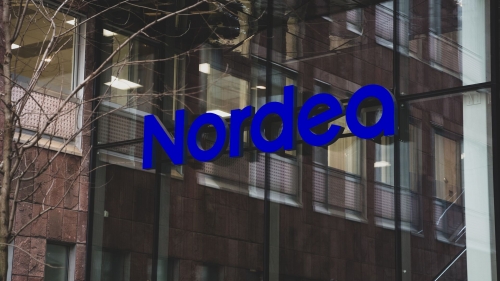Nordea is one of the largest financial services groups in the Nordic region and operates as a pan-Nordic universal bank. Nordea was formed in 2000 through a merger of four major banks from Sweden, Finland, Denmark, and Norway. The bank’s name is a combination of the words “Nordic” and “Idea,” reflecting its aim to be a leading financial institution in the Nordic market.
Nordea provides a broad range of financial services, including banking, investment, and insurance products, to private individuals, corporate customers, and institutional clients. The bank offers services such as savings and current accounts, mortgages, loans, investment management, asset financing, and wealth management.
Nordea operates across four Nordic countries: Sweden, Finland, Denmark, and Norway. It serves customers through a network of branches, digital channels, and customer service centers. Nordea’s large geographical coverage gives it a strong presence in the region’s financial markets.
Nordea is a significant player in the Nordic financial industry. As of the end of 2021, it had total assets of approximately EUR 641 billion, making it one of the largest banks in Europe. The bank employs over 30,000 people and serves millions of customers.
Nordea aims to provide excellent customer service and tailor its offerings to meet the specific needs of its diverse customer base. The bank serves individuals, families, small businesses, large corporations, and institutional investors. Nordea’s customer-centric approach includes offering personalized financial advice, digital banking solutions, and a wide range of financial products.
Nordea has been at the forefront of digital transformation within the banking industry. The bank has invested heavily in digital technologies and platforms to enhance customer experience and streamline operations. Nordea’s digital offerings include mobile banking apps, online banking services, electronic payment solutions, and digital investment platforms.
Nordea emphasizes sustainability and responsible banking practices. The bank integrates environmental, social, and governance (ESG) factors into its business operations and investment decisions. Nordea has set ambitious sustainability targets and aims to be a leader in sustainable finance and responsible investing.
Nordea operates in a highly regulated banking industry. It is supervised by various regulatory bodies, including national financial authorities and the European Central Bank (ECB). Compliance with regulatory requirements is a crucial aspect of Nordea’s operations to maintain stability and ensure customer trust.
Founding History of Nordea
Nordea has carved its place as a leading player in the Nordic banking industry. Its history is a testament to the consolidation and evolution of the region’s financial sector. This part delves into the intriguing journey of Nordea, from its humble beginnings to its position as a powerhouse in the Nordic market.
Nordea’s roots can be traced back to the year 2000 when four major Nordic banks merged to create a unified financial institution. The participating banks were Merita Bank (Finland), Nordbanken (Sweden), Unibank (Denmark), and Christiania Bank og Kreditkasse (Norway). This strategic merger aimed to establish a stronger presence in the Nordic region and leverage synergies to enhance competitiveness.
Early Years and Integration Challenges: The initial years of Nordea were marked by extensive integration efforts to harmonize operations, systems, and cultures across the four legacy banks. The integration process faced challenges, including reconciling diverse organizational structures and aligning differing regulatory frameworks. However, these hurdles were successfully overcome, paving the way for Nordea’s future growth.
Expanding Presence and Diversifying Services: Building on its foundation, Nordea embarked on an expansion journey to solidify its position in the Nordic market. The bank focused on organic growth, opening new branches and expanding its customer base across Sweden, Finland, Denmark, and Norway. Concurrently, Nordea broadened its service offerings to cater to a wide range of clients, from retail customers to large corporations and institutional investors.
Digital Transformation and Innovation: Recognizing the importance of digitalization, Nordea made significant investments in technology and embraced digital transformation. The bank introduced advanced online banking services, mobile applications, and innovative digital solutions to enhance customer experience and streamline operations. This forward-thinking approach allowed Nordea to stay ahead in the rapidly evolving digital landscape.
Navigating Challenges: Nordea, like many financial institutions, faced challenges during the global financial crisis of 2008. However, the bank’s conservative risk management approach and prudent financial practices helped it weather the storm relatively well. Nordea emerged from the crisis with strengthened resilience and a renewed commitment to maintaining stability and safeguarding customer interests.
Sustainable Finance and Responsible Banking: In recent years, Nordea has placed a strong emphasis on sustainability and responsible banking. The bank has actively integrated environmental, social, and governance (ESG) considerations into its operations and investment decisions. Nordea has set ambitious sustainability targets and strives to be a leader in sustainable finance, supporting the transition to a more sustainable future.
Ongoing Success and Financial Performance: Nordea’s commitment to customer-centricity, digital innovation, and responsible banking has contributed to its ongoing success. The bank has consistently delivered strong financial performance, showcasing robust capital adequacy ratios, healthy profitability, and sound asset quality. Nordea’s financial stability and market leadership have earned it recognition and trust among investors and stakeholders.
Nordea’s history exemplifies the power of collaboration and adaptability. From its formation through a merger of four major Nordic banks to its current status as a leading financial services group, Nordea has navigated challenges, embraced digital transformation, and prioritized responsible banking practices.
Business Divisions of Nordea
Nordea is a leading Nordic financial services group that operates across several business divisions. These divisions play a crucial role in Nordea’s overall strategy and provide a wide range of financial products and services to its customers. Here are the main business divisions of Nordea:
Retail Banking: The Retail Banking division focuses on providing financial services to individual customers, including retail banking products such as savings accounts, mortgages, consumer loans, credit cards, and payment solutions. This division aims to meet the personal banking needs of customers and offers a convenient and user-friendly banking experience through various digital channels and physical branches.
Corporate & Investment Banking: The Corporate & Investment Banking division caters to corporate and institutional clients, offering a comprehensive range of financial solutions and services. This division assists businesses with financing, risk management, cash management, trade finance, and capital market transactions. It also provides advisory services for mergers and acquisitions, capital raising, and other strategic initiatives.
Asset Management: Nordea’s Asset Management division focuses on managing and advising on investments for institutional and retail clients. It offers a diverse range of investment products, including mutual funds, alternative investments, pension solutions, and tailored investment strategies. The division’s team of investment professionals works to generate strong returns and manage risks based on clients’ objectives and risk profiles.
Wealth Management: The Wealth Management division targets high-net-worth individuals and affluent clients, providing them with personalized financial advice, investment management, and wealth planning services. It aims to preserve and grow clients’ wealth over the long term by offering comprehensive solutions, including asset allocation, estate planning, retirement planning, and philanthropic services.
Wholesale Banking: The Wholesale Banking division primarily serves large corporate and institutional clients, offering a wide range of banking services such as cash management, trade finance, liquidity management, risk management, and tailored financial solutions. This division focuses on building long-term relationships with its clients and supporting their complex financial needs.
Life & Pension: Nordea’s Life & Pension division is responsible for providing life insurance and pension products to both individuals and corporate customers. It offers various insurance policies, pension plans, and retirement savings solutions, helping individuals secure their financial futures and providing businesses with pension solutions for their employees.
Group Functions: The Group Functions division encompasses various support functions that provide services to other business divisions within Nordea. These functions include risk management, compliance, finance, legal, operations, technology, and human resources. They ensure the effective functioning and coordination of operations across the organization.
Website – Nordea Universal Bank
Also Read: Financial Powerhouse: Exploring the Legacy of American Express
To read more content like this, subscribe to our newsletter




